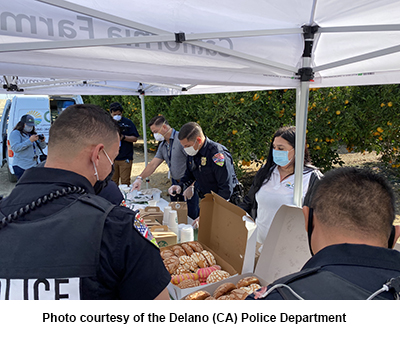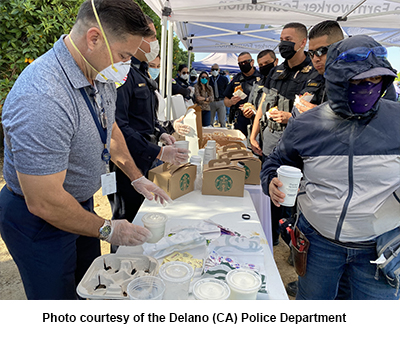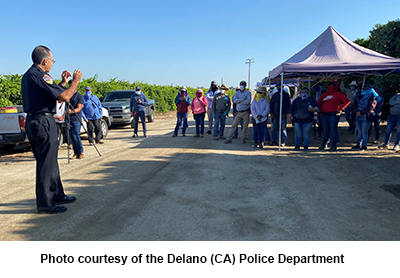Contact Us
To provide feedback on the Community Policing Dispatch, e-mail the editorial board at CPDispatch@usdoj.gov.
To obtain details on COPS Office programs, publications, and resources, contact the COPS Office Response Center at 800-421-6770 or AskCopsRC@usdoj.gov

U.S. Department of Justice
Office of Community Oriented Policing Services
Washington, DC 20530
With sirens blaring and lights blazing, six squad cars roared up a vineyard road in Delano, California, on June 5, 2020, halting in a cloud of dust before a group of farm workers. But the men and women who crowded around these cars weren’t alarmed by the officers’ arrival. To the contrary, they were delighted, having learned earlier that they were in for a treat from the Delano Police Department (DPD).
And indeed, they did have a good time—enjoying coffee, doughnuts, and Mexican bread at the table with Officer Guadalupe Contreras, chatting about work, family, and safety concerns with her, Officer Rafael Silva, Chief of Police Robert Nevarez, and other members of the department.
Honoring the Most Essential Members of the Community Where They Work
 The idea to turn Coffee with a Cop into Café con Campesinos (Spanish for “coffee with farm workers”) was the brainchild of Community Service Officer Silva, who, like Chief Nevarez, Officer Contreras, and most of the department’s 54 other officers, grew up with parents who worked in Delano’s fields.
The idea to turn Coffee with a Cop into Café con Campesinos (Spanish for “coffee with farm workers”) was the brainchild of Community Service Officer Silva, who, like Chief Nevarez, Officer Contreras, and most of the department’s 54 other officers, grew up with parents who worked in Delano’s fields.
Said Officer Silva, “When planning our usual Coffee with a Cop at a Starbucks, we decided to change the name and take it to a vineyard, where the Spanish-speaking farmworkers are. They can’t come to us in town during the week, so we went to them, with lights and sirens on to make it a special occasion. We wanted to pay tribute to and honor our farm workers,” he added. “Because they are the most essential people in our community, the ones who put food on our tables.”
Agriculture is the primary business of this small Kern County city, which lies in the San Joaquin Valley of south central California, about 130 miles east of Los Angeles. A major producer of table grapes and citrus, Delano was also the site of a grassroots movement for social justice in the 1960s, when Cesar Chavez and Larry Itliong led a five-year strike of vineyard laborers that won a fair work contract from California grape growers in 1970.
The Officers and Their Families Once Worked in the Fields Too
Said Chief Nevarez, “Back then, officers enforced laws that impacted laborers, and as a result, the cops were seen as bad guys. So there is great symbolism in our going back to the vineyards to connect in a positive, giving way. I get emotional talking with these people,” he added, “because I feel like I am reaching back, talking to my dad when he was in his teens and early twenties. He was a laborer who came from Mexico to pick grapes, and he was deported a few times when I was a boy. He always said ‘I will be back.’ But I worried that he wouldn’t. So I know the fear these people live with.”
Asked why he decided to go into law enforcement, Chief Nevarez said, “People from Mexico are law abiding, and my father always told us to follow the rules. So I grew up believing in supporting the law. Even when Dad was deported, he would say ‘you have to obey the laws. I will get my papers, and become a citizen.’ And he eventually did.”
A Reduction in Crime and an Increase in Community Trust
As for recruiting from the community, Chief Nevarez says that they’ve had success with that, which he attributes to the department’s standing among area residents—but he also inherited very good employees when he arrived at the DPD in 2018.
As examples, he cites the Kern County Officer of the Year awards, which went to Officer Silva and his supervisor Corporal Jose Madrigal, who both received the Community Involvement Awards, and Corporal Raymond McDermand, who received the Humanitarian Award.
Since becoming chief, Nevarez has set annual goals for the department. Among those set for 2020 was a 10 percent decrease in the number of gang shootings, a goal the department exceeded. They also decreased the number of burglaries and larcenies, which were at a 10-year low last year, as were auto theft and aggravated assaults.
He believes these accomplishments, especially those related to gang violence, are due in large part to the efforts the department is making to build community relationships. “Our community’s biggest concern is gang activities. So we provide information and education for parents.”
Producing a Podcast Series on Gang Violence
 With the help of a local TV channel and a financial grant from a major citrus grower, the DPD has produced a podcast series called Breaking the Cycle of Gang Violence.
With the help of a local TV channel and a financial grant from a major citrus grower, the DPD has produced a podcast series called Breaking the Cycle of Gang Violence.
These eight professional-quality videos feature a variety of speakers—including a probation officer, a judge, a victim’s family member, even a former gang member—and can be viewed on YouTube and on the DPD’s Facebook page.
The department also installed 60 cameras in locations where the most incidents occur and doubled the size of its gang unit. “But these are reactive efforts, and we are most interested in prevention,” Chief Nevarez says.
“We reach out to our young people as much as we can,” says Chief Nevarez. “One way is through barbershop meetings, where we go to talk, or ‘chop it up,’ as the kids call it. We talk about anything they’re interested in, like sports, school, and friends, to build relationships.”
“We enjoy meeting with the kids, and have fun with the elderly too, at senior citizen villages, where we play Lotería Con la Policía. It’s like bingo, but with images instead of numbers. I call out the figures on the cards, and they love it.”
Personal Communication is the Foundation
 The department also holds regular Town Hall meetings and has set up a Community Law Enforcement Liaison Board, which meets virtually every three months.
The department also holds regular Town Hall meetings and has set up a Community Law Enforcement Liaison Board, which meets virtually every three months.
Says Chief Nevarez, “Anybody can call in, and we discuss a variety of issues, to let people know about the number of investigations, their status, if there was discipline and if so, what it was. So if there are issues brewing, they don’t fester.”
But the communications that make the biggest difference are personal, one to one. And this is the value of Café con Campesinos. Says Officer Silva, “It was a great way to meet, in an informal setting instead of a situation when they’re in distress. And they ask a lot of good questions when they’re comfortable. It meant a lot to me because I was born and raised in Delano,” he adds, “I tell them that I worked in the fields when I was growing up, as did my parents.”
The same is true for Officer Contreras, and for Chief Nevarez too, who summed up their relationship with the community by saying: “We wanted to show these men and women that we are not simply like them—we are them.”
Faye C. Elkins
Sr. Technical Writer
COPS Office
Subscribe to Email Updates
To sign up for monthly updates or to access your subscriber preferences, please enter your email address in the Subscribe box.






